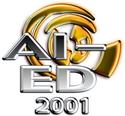
Home
Notes From Invited Program NEW
New Poster- Baylor (missing from Proceedings) NEW
Program
Workshops and Tutorials
Registration
Lodging
San Antonio Information
Author Information
International AI-ED Society
Program
Note: all AI-ED 2001 presentations are in the University Center on St Mary's University campus (see San Antionio Information for details).
|
Workshops and
Tutorials |
|||||||||||||||||||||||||||||||||||||||||||||||||||||||||||||||||||||||||||||
|
||||||||||||||||||||||||||||||||||||||||||||||||||||||||||||||||||||||||||||||
9:00am -- 10:30am | ||||||||||||||||||||||||||||||||||||||||||||||||||||||||||||||||||||||||||||||
Kodak/Royal Academy of Engineering Professor of Educational Technology University of Birmingham, UK | ||||||||||||||||||||||||||||||||||||||||||||||||||||||||||||||||||||||||||||||
10:30am -- 11:00am | ||||||||||||||||||||||||||||||||||||||||||||||||||||||||||||||||||||||||||||||
11:00am -- 12:30pm | ||||||||||||||||||||||||||||||||||||||||||||||||||||||||||||||||||||||||||||||
|
| |||||||||||||||||||||||||||||||||||||||||||||||||||||||||||||||||||||||||||||
Collaborative Learning and Problem Solving
|
Case-based Systems
|
|||||||||||||||||||||||||||||||||||||||||||||||||||||||||||||||||||||||||||||
12:30pm -- 2:00pm | ||||||||||||||||||||||||||||||||||||||||||||||||||||||||||||||||||||||||||||||
9:00am -- 10:30am | ||||||||||||||||||||||||||||||||||||||||||||||||||||||||||||||||||||||||||||||
Professor of Mathematics, Science and Technology Education University of California, Berkeley, USA | ||||||||||||||||||||||||||||||||||||||||||||||||||||||||||||||||||||||||||||||
10:30am -- 11:00am | ||||||||||||||||||||||||||||||||||||||||||||||||||||||||||||||||||||||||||||||
11:00am -- 12:30pm | ||||||||||||||||||||||||||||||||||||||||||||||||||||||||||||||||||||||||||||||
|
| |||||||||||||||||||||||||||||||||||||||||||||||||||||||||||||||||||||||||||||
Adaptive Hypertext and Navigation
|
Student Modelling I
| |||||||||||||||||||||||||||||||||||||||||||||||||||||||||||||||||||||||||||||
12:30pm -- 1:30pm | ||||||||||||||||||||||||||||||||||||||||||||||||||||||||||||||||||||||||||||||
1:30pm --3:30pm | ||||||||||||||||||||||||||||||||||||||||||||||||||||||||||||||||||||||||||||||
|
| |||||||||||||||||||||||||||||||||||||||||||||||||||||||||||||||||||||||||||||
Evaluation of Systems
|
Student Modelling II
| |||||||||||||||||||||||||||||||||||||||||||||||||||||||||||||||||||||||||||||
3:00pm -- 3:30pm | ||||||||||||||||||||||||||||||||||||||||||||||||||||||||||||||||||||||||||||||
3:30pm -- 5:00pm | ||||||||||||||||||||||||||||||||||||||||||||||||||||||||||||||||||||||||||||||
|
| |||||||||||||||||||||||||||||||||||||||||||||||||||||||||||||||||||||||||||||
Virtual Reality - Chair: Lewis Johnson |
Assessing Students' Answers & Task Analysis
| |||||||||||||||||||||||||||||||||||||||||||||||||||||||||||||||||||||||||||||
| ||||||||||||||||||||||||||||||||||||||||||||||||||||||||||||||||||||||||||||||
Session
3
2:00pm -- 3:30pm
2:00pm -- 3:30pm
Track 1
Track
2
Collaboration and Collaborative Tools
- An Instructional Design Support Environment for CSCL -- Fundamental
Concepts and Design Patterns
Akiko Inaba, Ryoji Ohkubo,Mitsuru Ikeda, Riichiro Mizoguchi, Jun'ichi Toyoda - Supporting Conversations and Learning in Online Chat
Chee-Kit Looi - A Collaboration Monitor for Shared Workspaces
Martin Muehlenbrock, H. Ulrich Hoppe,
Narrative, Agents and Games
- Imbedding AIED in ie-TV through Broadband User Modelling
(BbUM)
Rosemary Luckin, Benedict du Boulay - Learning by playing - Supporting and guiding story-creation
activities
Isabel Machado, Paul Brna, Ana Paiva - Pause the Video: Quick But Quantitative Expert Evaluation of
Tutorial Choices in a Reading Tutor that Listens
Jack Mostow, Cathy Huang, Brian Tobin
Break
3:30pm -- 4:00pm
3:30pm -- 4:00pm
Session
4
4:00pm --5:30pm
4:00pm --5:30pm
Track 1
Track
2
Pedagogical Agents
- Extending Intelligent Learning Environments with Teachable Agents
to Enhance Learning
Gautam Biswas, John Bransford, Thomas Katzlberger, Daniel Schwartz - Teaching to Plan and Planning to Teach in an Embedded Training
System
Brant Cheikes, Abigail Gertner - Lessons Learned in Deploying a Multi-Agent Learning Support System:
The I-Help Experience
Jim Greer, Gord McCalla, Julita Vassileva, Ralph Deters, Susan Bull, Lori Kettel
Multiple Representations and Interface Design
- VisiGarp: Graphical Representation of Qualitative Simulation
Models
Anders Bouwer, Bert Bredeweg - ExploraGraph: Improving interfaces to improve adaptive
support
Aude Dufresne - Applying the DeFT Framework to the Design of Multi-Representational
Instructional Simulations
Nicolas Van Labeke, Shaaron Ainsworth - An Approach to Increasing Programming Efficiency in Plan-Based
Dialogue Systems
Reva Freedman - Processing Language Input in the CIRCSIM-Tutor Intelligent Tutoring
System
Michael Glass - Tools for Authoring Tutorial Dialogue Knowledge
Pamela Jordan, Carolyn Rosé, Kurt VanLehn - An Automated Lab Instructor for Simulated Science
Experiments
Aaron D'Souz, Jeff Rickel, Bruno Herreros, W. Lewis Johnson -
A Knowledge-Based Approach to Designing Authoring Tools: From Tutor
to Author
Susanne Lajoie, Sonia Faremo, Jeffrey Wiseman - Supporting Teacher Development in Enacting the RiverWeb Water
Quality Simulator
Mary Ellen Verona, David Curtis, Donald Shaffer - Towards Tutorial Dialog to Support Self-Explanation: Adding Natural
Language Understanding to a Cognitive Tutor
Vincent Aleven, Octav Popescu, Kenneth R. Koedinger - Factoids: Automatically constructing and administering vocabulary
assistance and assessment
Gregory Aist - Interactive Conceptual Tutoring in Atlas-Andes
Carolyn Rose, Pamela Jordan, Michael Ringenberg, Stephanie Siler, Kurt VanLehn, Anders Weinstein - The Integrated Learning Model: A Design Experiment in Web-Based
Instruction
Arshad Ahmad, Susanne Lajoie - On improving the effectiveness of open learning environments
through tailored support for exploration
Andrea Bunt, Cristina Conati, Michael Huggett, Kasia Muldner - A Review of CALL Systems in Foreign Language Instruction
Johann Gamper, Judith Knapp
Reception
Poster
Session 2
6:00pm -- 9:00pm
Tuesday 22nd May
Poster
Session 2
6:00pm -- 9:00pm
6:00pm -- 9:00pm
Tuesday 22nd May
Session
5
9:00am -- 10:30am
9:00am -- 10:30am
Human Computer Interaction Institute
Carnegie Mellon University, USA
Co-Founder, Carnegie Learning, Inc.
Break
10:30am -- 11:00am
10:30am -- 11:00am
Session
6
11:00am -- 12:30pm
11:00am -- 12:30pm
Track 1
Track
2
Dialogue I
Authoring and Teacher Tools
Lunch
12:30pm -- 1:30pm
12:30pm -- 1:30pm
Session
7
1:30pm -- 3:00pm
1:30pm -- 3:00pm
Track 1
Track
2
Dialogue II
Open Learning Environments and CALL
Break
3:00pm -- 3:30pm
3:00pm -- 3:30pm
Session
8
3:30pm -- 5:30pm
3:30pm -- 5:30pm